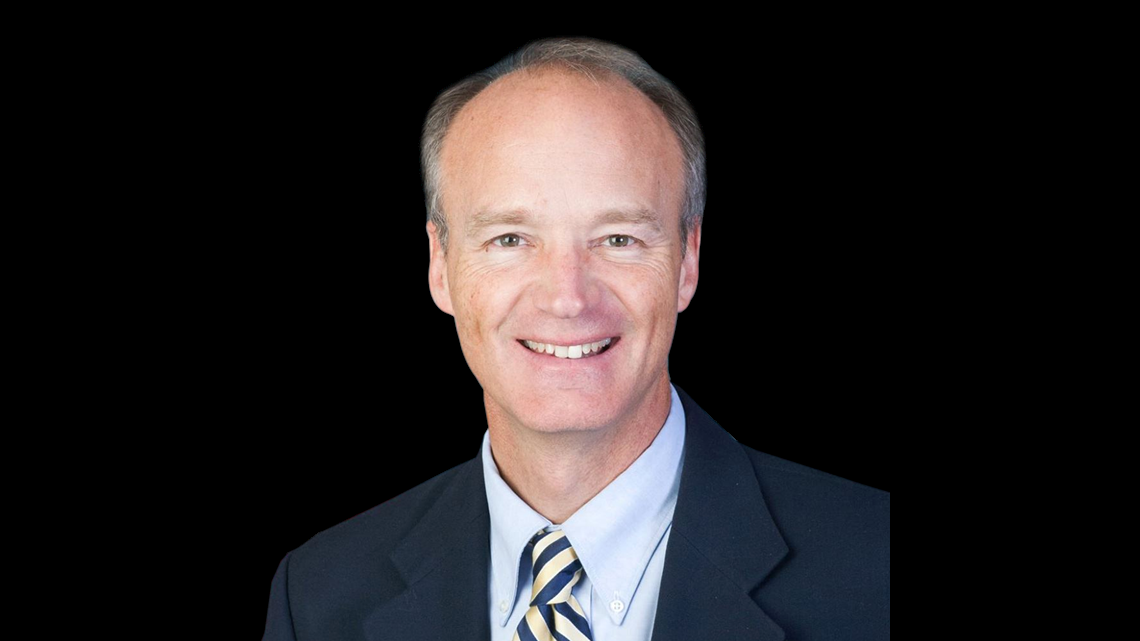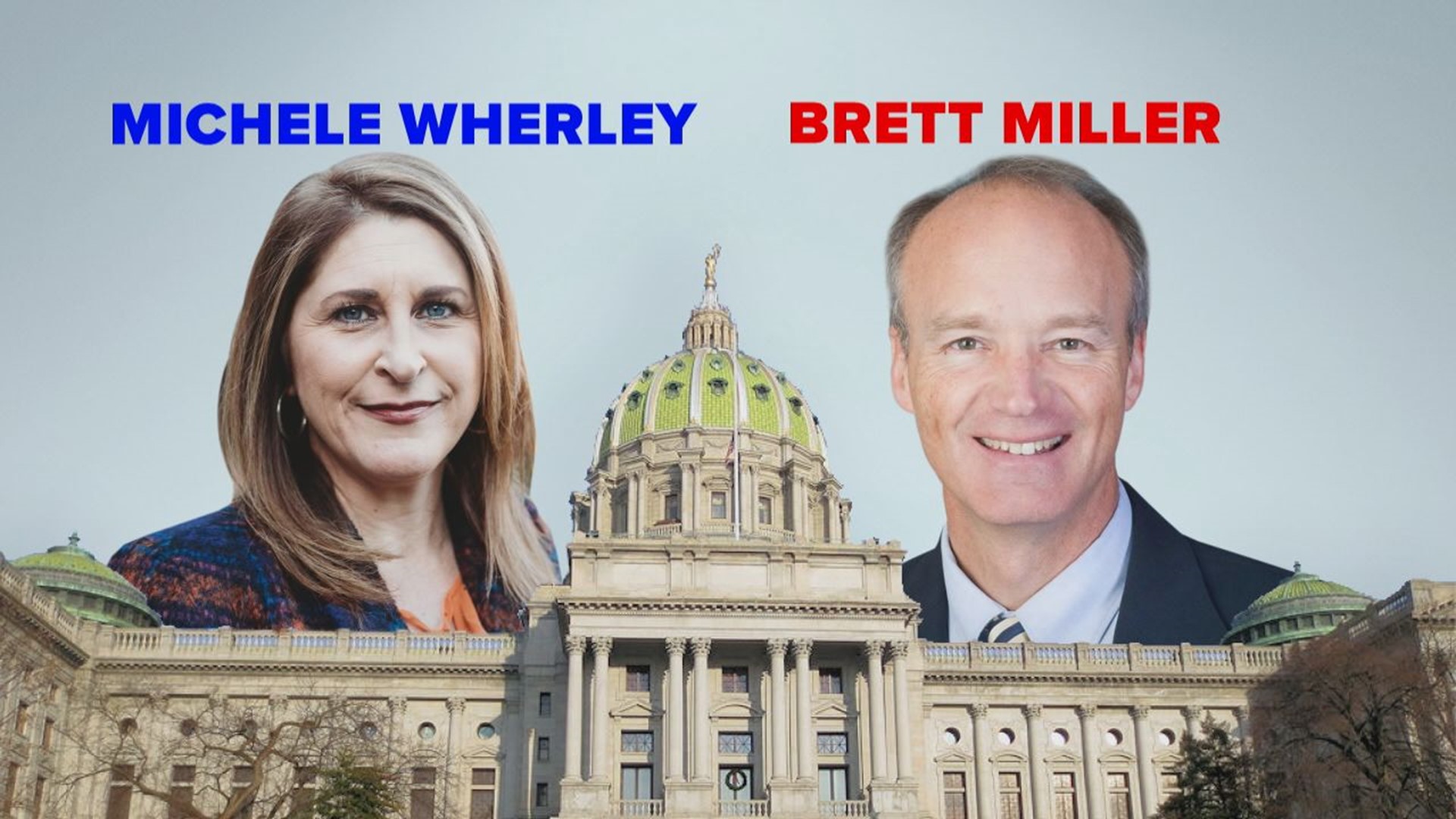Democracy 2020 takes a look at the State House race for the 41st District in western Lancaster County.
Republican Representative Brett Miller was elected to the district seat in 2015. Democrat Michele Wherley is facing Miller for the second straight general election. Miller is seeking a fourth term as 41st District representative.
Miller says his goal is to protect taxpayers, and wants to use his 26 years experience in the public school system to improve education in the commonwealth. Miller says his top goals if re-elected include property tax reform, state and federal CARES Act money sent to schools, and also wants to increase pension fund fee transparency.
Wherley is a mother and local business leader who lost her bid to Miller in 2018. She says she wants to see Pennsylvania use the fair funding formula for education reform.
Wherley also hopes to raise the minimum wage, and promote environmental protections.
FOX43 sent both candidates questionnaires about their candidacies and both returned their answers below.
For more election coverage, where to vote, information about the candidates, and other stories about voting safety and security, visit the FOX43 Election Voting Guide.
RELATED: Pa State House 41st District




1. Why do you want to represent your district?
REPRESENTATIVE BRETT MILLER: I am running because I want to use my 26-year background in public education, as well as my experience in local government to advance policies that benefit the people of the 41st District. I am running to protect taxpayers by fighting for property tax relief, finding ways to control government spending, and making sure government lives within its means. I will use my experience as a public school educator to advocate for an education system that is fiscally and academically strong, and one that provides expanded educational opportunities for students. Finally, I am running to continue advocating for policies that make Pennsylvania a more welcoming place for businesses and job creators to locate, stay, and grow, thereby creating even more prosperity and more family sustaining jobs.
MICHELE WHERLEY: I think politics should be a positive word. We’re all citizens participating in a shared, common life together and politics is how we arrange ourselves in this shared life. Sadly, what people are seeing in politics today is the polluting of that common life—money, special interests, theatrics, and the desire for power over principles. My campaign is focused on the issues that affect our neighbors most: Economic security and living wages, fully and equitably funding public schools from pre-k through college, and protecting our environment.
2. What area of public policy are you most passionate about and why?
REP. MILLER: I am most passionate about our state's fiscal policy. Our tax policy on the personal, property and business levels have a dramatic impact on one's ability to meet day-to-day needs, achieve upward mobility, and prepare for future needs. They affect the ability of people to either purchase a home or stay in their home. They affect the ability of businesses to stay in business, grow, meet the needs of their employees and hire additional employees. And on a statewide level, our tax policies impact the Commonwealth's ability to compete with other states for good employees and for businesses to locate here. Government expenditures need to be brought under control and our tax policy managed so that government can function effectively and the taxpayer can keep more of his/her hard earned money. As the saying goes, "We can't tax our way into prosperity." As we grow our economy, tax revenues will naturally increase, and people will have greater means to meet the needs of their families. Of particular note on this subject is the impact of our state's public pension systems on our state budget. These consume approximately 14% of our state's general fund budget, have a combined unfunded liability of $70 billion dollars, and are only about 50% funded. We must shore up these systems so the state can keep its promised obligations to beneficiaries and simultaneously help reduce the ever climbing property tax burden that largely stems from the weak status of our pension systems.
WHERLEY: I believe in a robust public education system. Our students should receive a quality education no matter their ZIP code. The vast majority of kids in the Commonwealth are educated in public schools and we are doing them a disservice by not funding education appropriately. We must fully adopt the Fair Funding Formula because it solves the dual problems of underfunding of our schools and the inequity of the funding. We know that quality education at all levels is a driver of workforce and economic development, so we simply can’t afford to continue down this path without compromising our ability to prepare, train, and up-skill the workforce of tomorrow.
3. Name three goals you wish to accomplish in the next term if elected?
REP. MILLER: 1. I want to see property tax reform achieved. I have voted for property tax reform that would have reduced property taxes by 30-40% for every homeowner. Though the plan passed in the House, it failed to advance in the Senate. Other proposals have been developed which will achieve a 50% property tax reduction for every homeowner with a path toward total elimination. This measure needs to pass.
2. As a former public school educator, I want to strengthen our education system with the necessary funds, policies, and resources to meet the continued demands imposed by the pandemic. This includes allocating state and federal CARES money to meet the needs of schools, providing relief from testing requirements and other state mandates that restrict school districts from being able to deliver a quality education, and expanding broadband availability for our rural schools.
3. I would like to continue my efforts to increase pension fund fee transparency in our two state pension systems. Billions of taxpayer dollars are being paid to money managers with taxpayers, pension plan beneficiaries, and even legislators having almost no ability to know what these fees are, whether or not they are reasonable, or whether the investments being made are profitable. The ones who should be profiting are the citizens of Pennsylvania and not Wall Street money managers. The people of Pennsylvania need to know what these fees are.
WHERLEY: Name three goals you wish to accomplish in the next term if elected? Education funding reform, raising the minimum wage to provide greater economic security for working families, environmental protections to improve our air, soil and water quality and to move away from petrochemicals and toward clean energy.
4. What is the biggest challenge facing Pennsylvanians in the next couple years?
REP. MILLER: The biggest challenge facing Pennsylvania over the next few years will be the state budget. Due to decisions made in regard to the pandemic, our state budget is facing an approximate shortfall of $5 billion, or 15% of our budget. Pennsylvania's financial condition will only worsen the longer the shutdown continues.
WHERLEY: The biggest challenge facing Pennsylvanians in the next couple of years will be the fallout from the COVID-19 pandemic, both economic and personal.
5. COVID-19 will continue to be a part of our lives in 2021 and beyond. What should Pennsylvania’s top priorities be as it relates to the pandemic?
REP. MILLER: Pennsylvania's top priorities should be to continue to provide coordination and logistics between federal and local governments, medical institutions and the citizens to ensure the needed supplies, such as PPE, tests, and eventually a vaccine, get distributed appropriately. We should also make our data as transparent as possible so the public is fully informed with accurate information. Along with this, our state needs to find ways to allow businesses to safely open so as to stop the tidal wave of bankruptcies and staggering unemployment numbers from growing beyond what they already are.
WHERLEY: COVID-19 will continue to be a part of our lives in 2021 and beyond. What should Pennsylvania’s top priorities be as it relates to the pandemic? COVID-19 is creating chaos in our lives, with the impact falling unequally on our population. While it’s important to alleviate the economic impact, we must first deal with public health. Rapid testing, tracing, and isolation of persons with positive tests is critical and should be ongoing. In Pennsylvania, we spend $13 per person on public health. The national average is $36. If limited funding is hindering our response to COVID-19 the administration should seek additional funds and the General Assembly should provide them. If we want a stronger economic recovery we should get money into the hands of people who will spend it. Middle class wages are stagnant, many families are living paycheck to paycheck--sometimes working multiple jobs and still not making ends meet. We must address the immediate challenges these families face. We could do that by getting on a pathway to increase the minimum wage. It would be very helpful to receive some federal relief in the form of a stimulus that invests in infrastructure. Pennsylvania could then utilize that federal stimulus money for much needed infrastructure improvement projects such as high-quality broadband access.
6. Dr. Deborah Birx of the White House’s Coronavirus Task Force praised Pennsylvania for how it has handled the COVID-19 pandemic. How would you assess the commonwealth’s response?
REP. MILLER: Pennsylvania's response has been mixed. Pennsylvania is blessed with some of the best medical institutions and personnel in the world. This was a huge advantage in responding to the virus and decisions were made which no doubt lessened the number of illnesses and deaths. We were fortunate to not have the mortality rates of some of our neighboring states but the Administration's policies did not protect the most vulnerable population in our senior living facilities; in fact, they actively put them at higher risk. Further, the citizens of Pennsylvania were largely shut out of their constitutionally protected rights of being able to participate in decisions being made on their behalf. Many believe their constitutional rights have been violated as decisions were made without their ability to have input, their elected representatives had no say or vote in edicts that were issued on their behalf, and the Administration blocked all access to records. Finally, utilizing a one-size-fits-all decision-making model in such a diverse state as Pennsylvania is neither supported by scientific data nor commonsense considerations. The full extent of the economic and social damage as a result of the decisions that have been made will likely impact our state for years to come.
WHERLEY: COVID-19 has placed us in an impossible situation. The circumstances are constantly evolving and most of our options are bad. In the absence of coordinated national leadership, Governor Wolf and his team had to make a lot of very difficult decisions. Citizens of the commonwealth may disagree on whether the right calls were made, but I give the Governor and his team credit for making the tough calls, doing what had to be done, and then taking the heat for those decisions. That’s what leaders are called to do in times of crisis.
7. What needs to be done in order to improve Pennsylvania’s economy?
REP. MILLER: To improve our economy, we need to lessen the tax and regulatory burden on businesses so that more businesses will choose to locate and grow in Pennsylvania. This will, in turn, cause a reversal of the net out-migration of our younger workers to other states that have a more business friendly environment. Fixing the crushing property tax burden will also help younger families afford to stay in this state, and help older Pennsylvanians to stay in their homes. We also need to expand and improve workforce development training and opportunities to provide our workforce with the necessary skills needed by employers.
WHERLEY: What needs to be done in order to improve Pennsylvania’s economy? Pennsylvania will need to raise revenue during the coming years in order to overcome the challenges of COVID-19. We should enact combined reporting and close the Delaware Loophole. We should also legalize and tax recreational, adult-use marijuana as many other states have done.
8. Social unrest has played out in front of us as citizens protest the killings of George Floyd, Breanna Taylor, and other Black men and women. What changes are needed to state laws as it relates to criminal justice reform?
REP. MILLER: Because all citizens are equal, we must keep our communities safe and ensure everyone receives equal treatment under the law. I voted for HB 1841, which requires a thorough background check for law enforcement applicants prior to being employed and requires a law enforcement agency to disclose employment information. Passage of this will help ensure disqualified individuals do not become members of law enforcement and commit the illegal actions that we have seen over the years. I also voted for HB 1910, which requires mental health evaluations with a focus on PTSD of law enforcement officers as a condition of continued employment. The evaluation may be upon request of a law enforcement officer or a police chief or within 30 days of an incident of the use of lethal force. I’m pleased both of these bills have now become law, and while these are positive steps, more needs to be done to achieve racial reconciliation.
WHERLEY: Changes to laws around civil asset forfeiture, ending punitive drug policies, end mandatory minimums are sorely needed. We must eliminate cash bail which punishes poverty instead of curbing crime of any kind. Communities need more crime prevention programs and resources rather than punitive responses after crime occurs. And of course, when we talk about crime prevention, this also means better education, more access to healthcare, better wages, etc
9. What changes would you make to Pennsylvania’s unemployment compensation system?
REP. MILLER: Pennsylvania’s Unemployment Compensation system was slated for an upgrade several years ago. Had it not been for the mismanagement of funds within that department, these upgrades would have already been accomplished. The current situation has more than illustrated the need for taking full advantage of the best UC practices in the nation and the new technology that is available so that people who find themselves in vulnerable financial situations are not waiting weeks or months for assistance.
WHERLEY: The biggest problem right now is that the agency is using 50-year old technology to process an overwhelming number of claims. The system is extremely outdated and update is in the works, but it seems that these necessary changes won’t be rolling out anytime soon. Right now, there are also many applicants who simply have little or no internet access and must rely on calling the telephone hotline at the agency, which has also been completely overwhelmed. The agency was also understaffed prior to the COVID-19 crisis, so they just weren’t prepared for the deluge of unemployment compensation claims they received in the recent months. Unemployment compensation is part of the safety net for many Pennsylvanians during a crisis like this. What we’re seeing with the UC system is what happens when much needed improvements to safety net programs are put off for too long.
10. Are you confident in the security and results of this election?
REP. MILLER: Every citizen is entitled to a fair, legal, and accountable election. Citizens have a right to vote and to expect an honest outcome. As long as all laws are followed, all citizens can have confidence in the election results.
WHERLEY: I am confident in the hard work our Commonwealth is putting into security measures and access to voting. Although voting by mail on this scale is new to Pennsylvania, many other states have been voting exclusively by mail for decades with no evidence of increased fraud. The most important thing Pennsylvanians can do is come out and vote.

